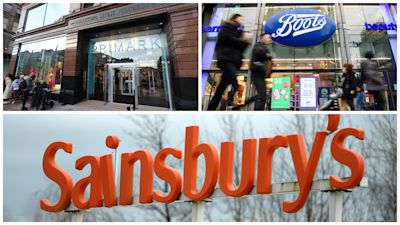Retailers warn Budget will trigger job losses, price rises and store closures

Retail bosses have signed a joint letter urging the Chancellor to reconsider some of her budget decisions, as ITV News' Business and Economics Editor Joel Hills reports
Higher prices, lower pay, shop closures and job cuts are on the way unless the Chancellor rethinks her Budget.
That is the warning from a Who’s Who of retailers in the UK who have put their names to a letter declaring that government policy has saddled them with £7 billion of costs that they will need to pass on.
The ire of Aldi, Amazon, Asda, B&Q, Boots, Curry’s, H&M, JD Sports, Lidl, Monsoon, M&S, Next, Primark, Sainsbury’s and Tesco is directed at governments past and present.
The higher tax bill Rachel Reeves handed them in the Budget in the form of National Insurance changes is only £2.3 billion of the story.
The hit from the National Living Wage is larger, at £2.7 billion - although this is a cost that rises every year so can’t have entirely come as a shock.
Subscribe free to our weekly newsletter for exclusive and original coverage from ITV News. Direct to your inbox every Friday morning.
The “packaging levy” - a tax to fund recycling introduced by the Conservative government - completes the Triple-Whammy with £2 billion of extra costs.
The letter states: “For any retailer, large or small, it will not be possible to absorb such significant cost increases over such a short timescale.
"The effect will be to increase inflation, slow pay growth, cause shop closures and reduced jobs, especially at the entry level. This will impact high streets and customers across the country.”
The signatories of this letter are huge businesses with huge balance sheets but a sudden increase in fixed overheads on this scale is plainly going to be felt.
How worried should we be?
The Bank of England said two weeks ago that it would be watching carefully to see how businesses respond to the measures announced in the Budget.
The Bank’s best guess is that they will prove to be a little inflationary and that unemployment will edge up.
The government’s own forecaster, the Office for Budget Responsibility, assumes that most of the impact of the national insurance changes (80%) will depress wages in the next few years and the balance will reduce company profitability.
But other outcomes are possible.
Price rises of some description do feel like an inevitability, not least as national insurance is a tax on labour, which applies whether or not a business makes money.
The share prices of those retailers that are stock market listed aren’t signaling alarm and it’s very hard to imagine the cumulative impact of government policies presents an existential threat to any retailer in the chorus of the disgruntled.
The likes of M&S, Sainsbury’s and Tesco may not like paying more tax but they are also reasonably well-placed to cope.
The most exposed are the smaller operators who, by and large, haven’t signed this letter. For some, the Budget could be the difference between muddling through and throwing in the towel.
The lifeline the Chancellor could have extended was reform of business rates - another tax collected by councils on commercial property and used to fund local services.
Rachel Reeves hinted at rebalancing the tax in her Budget, lightening the load for retail, hospitality and leisure properties and increasing it for Amazon’s empire of warehouses but only from 2026/27 and she everyone guessing at the details.
The cavalry looks like it may be coming. The worry is it may arrive too late.
Have you heard The Trapped? Listen as Daniel Hewitt exposes the UK's dirty secret